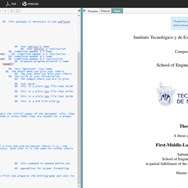
Overleaf
Overleaf is a leading online collaborative writing and publishing tool specifically designed for LaTeX, offering real-time collaboration, integrated PDF preview, version control, and simplified publishing workflows for academic, scientific, and professional writing.
About Overleaf
Overleaf is a powerful and intuitive online LaTeX editor that streamlines the process of writing, editing, and publishing academic papers, reports, presentations, and other documents. At its core, Overleaf provides a real-time collaborative environment, allowing multiple authors to work on the same document simultaneously without the complexities of manual file merging or version conflicts. This is a significant advantage, especially for research teams and co-authorships.
The platform is built around the powerful LaTeX typesetting system, renowned for its ability to handle complex mathematical equations, citations, and structural formatting with precision. Overleaf lowers the barrier to entry for LaTeX by providing a user-friendly web interface, eliminating the need for local installations and configuration.
Key features include:- Real-time Collaboration: See who is editing and what changes are being made in real-time.
- Integrated PDF Viewer: Instantly compile your LaTeX source and view the generated PDF alongside the editor.
- Version Control: Track changes, revert to previous versions, and collaborate with confidence.
- Cloud Sync: All your work is stored securely in the cloud, accessible from any device with an internet connection.
- Templates and Examples: Access a vast library of templates for journals, universities, and document types to get started quickly.
- Rich Text Editor and Source Editor: Switch between a visual editor for simpler tasks and the full LaTeX source editor for complete control.
- Publishing Tools: Direct submission links and integrations with various journals and repositories.
Overleaf excels in academic and technical writing where precise formatting, complex equations, and collaborative workflows are essential. Its blend of powerful LaTeX features and accessible online collaboration makes it an indispensable tool for researchers, students, educators, and professionals who require high-quality document production and efficient team writing.
Pros & Cons
Pros
- Real-time collaboration is highly effective for team writing.
- Integrated PDF preview speeds up the writing and editing process.
- No software installation required, accessible from anywhere.
- Simplifies the use of powerful LaTeX features.
- Built-in version control is excellent for tracking changes.
- Large library of templates available.
Cons
- Requires some understanding of LaTeX syntax.
- Free plan has limitations on collaborators and features.
- Offline editing is not a primary focus.
Features & Capabilities
14 featuresExpert Review
Overleaf has established itself as a cornerstone in the realm of online collaborative writing, particularly for users who rely on the power and precision of LaTeX. Its primary appeal lies in marrying the robust typesetting capabilities of LaTeX with a user-friendly, real-time collaborative online environment. This combination effectively removes many of the traditional barriers to using LaTeX, such as complex installations and synchronization issues when working with multiple authors.
The real-time collaboration feature is arguably Overleaf's most compelling asset. The ability for several individuals to simultaneously edit a document and see each other's changes in real-time significantly streamlines the writing process for research teams, students working on group projects, and anyone involved in co-authoring. Version control is tightly integrated, providing a clear history of changes and the ability to revert to previous states, which is crucial for managing revisions and avoiding conflicts.
The integrated PDF viewer is another major convenience. As soon as you compile your LaTeX code, a preview of the compiled PDF appears alongside the editor. This rapid feedback loop allows users to see the impact of their code changes immediately, making debugging and formatting adjustments much more efficient compared to traditional offline LaTeX workflows where compilation and viewing are separate steps.
Overleaf's web-based nature means there is no software to install or configure. Accessing your projects from any device with an internet connection is seamless. This cloud-based approach also simplifies sharing; a simple link allows collaborators to access and contribute to a project, with customizable permissions to control access levels.
While Overleaf simplifies LaTeX usage, a basic understanding of LaTeX syntax is still required to leverage its full potential. The platform offers a wealth of templates and documentation to assist newcomers, but there is still a learning curve associated with mastering LaTeX itself. However, the online environment and real-time error highlighting provided by Overleaf make this learning process more approachable.
The platform provides both a source code editor for direct LaTeX input and a rich text editor for more visual editing. This caters to different user preferences and skill levels, although the full control and power of Overleaf are best realized through the source editor.
Features like the equation editor, support for Unicode, and cross-referencing tools are essential for academic and technical writing and are well-implemented within Overleaf. The ability to define and use macros further enhances efficiency for repetitive formatting tasks.
Overleaf offers various subscription tiers, with free plans providing basic functionality suitable for individual projects and premium plans offering enhanced features like increased storage, more collaborators, and advanced integrations. The pricing structure is generally reasonable, especially considering the productivity gains and collaborative capabilities it offers.
Potential areas for minor improvement could include more robust offline editing capabilities or a more powerful visual editor that provides a closer WYSIWYG experience while still maintaining the underlying LaTeX structure. However, these are relatively minor points in an otherwise excellent tool.
In conclusion, Overleaf is a robust, user-friendly, and highly effective platform for collaborative LaTeX writing and publishing. Its combination of real-time collaboration, integrated PDF preview, cloud accessibility, and powerful LaTeX features makes it an indispensable tool for anyone involved in academic, scientific, or high-quality document creation. It successfully bridges the gap between the power of LaTeX and the convenience of online collaboration, significantly enhancing productivity and teamwork.













